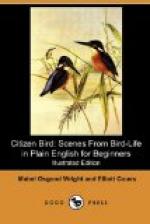“Yes, but their voices are so very different.”
“So are the voices of birds, when you know them well.”
“But the young birds who have been hatched up here—how do they know about going the first time?” asked Rap.
“The young ones are led in their journeys with signals and cries by their parents; they in turn lead their own young, and so the knowledge is kept up endlessly.”
“I can see why they go south,” said Rap, after thinking a few moments, “but why do they come back again? Why don’t they stay and build their nests down there?”
“That is a difficult question to answer,” said the Doctor, “and one that we House People try to explain in different ways. I think that the love of the place where they were born is strong enough in birds to bring them back every season to build their nests. So you see that Citizen Bird is a patriot; for, though he may be in the midst of plenty in a tropical forest, when the time comes he travels hundreds of miles to his native land to make the young, that will fly from his nest, citizens like himself.”
“But the birds that can eat seeds and other things do not travel so far, do they?” asked Rap.
“No, the birds who rove about the United States throughout the year are either Weed Warriors, or Seed Sowers, or those Tree Trappers who creep about tree-trunks picking the eggs and grubs of insects from the bark. Or else those great Cannibal Birds, the Wise Watchers, who eat the flesh of their smaller brothers, as well as of rats, mice, and all such vermin—the Hawks and Owls; or else they are Gulls, Terns, Fishing Ducks, and a great many other kinds of sea birds who feed on fish and pick up the scraps floating on the surface of sea, lake, and river.”
“Do the Barn Swallows that are making nests in the hayloft go as far south as Kingbirds?” asked Nat.
“Yes, indeed! The Swallows’ swift flight carries them far and wide, for not only do they make homes all through North America, but they are so sure of wing and confident of outstripping any cannibal birds who might try to chase them, that when they leave us they fly by day and often stop for a little visit in the West Indies on their way to South America.”
“Suppose, Uncle Roy, when they are travelling, a storm comes up and it grows so foggy they can’t see how to follow the rivers—don’t they sometimes lose themselves?”
“Yes, very often they become confused and fly this way and that, but always toward the nearest place where they see a light, as if it meant escape for them. But this instinct is frequently their death, for they fly against the towers of great lighthouses, or the windows of tall buildings, or even electric wires, and thus break their necks or wings.”
“That is why I have so often found dead birds along the turnpike under the telegraph wires,” said Rap.




